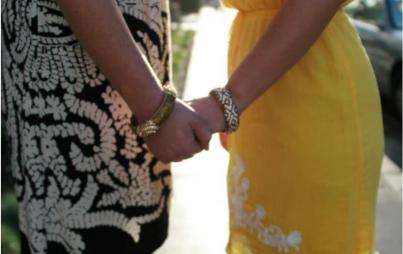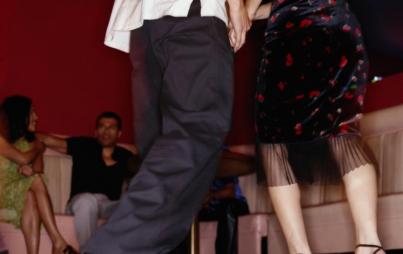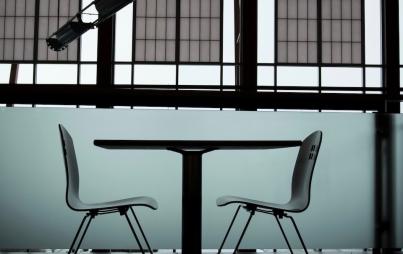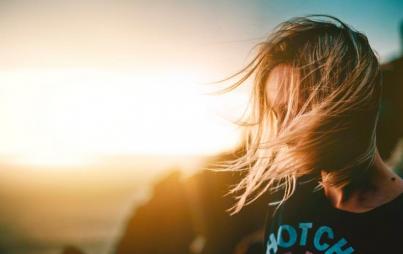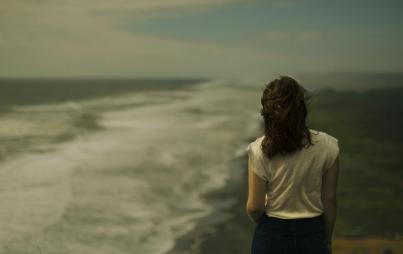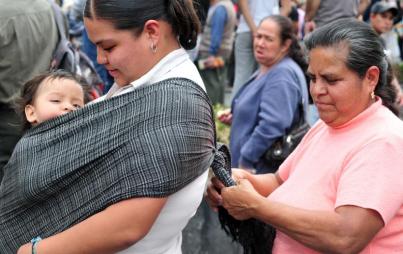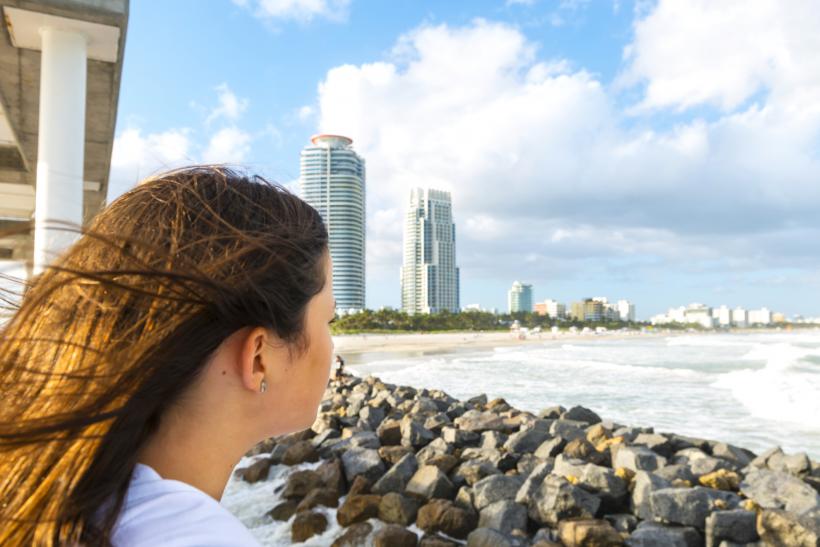
“We are moving to America,” they told me.
Long Reads is a bimonthly feature, showcasing long-form essays.
I sat patiently on my bed as my mom wrapped a Russian scarf around my head and carefully tucked my hair underneath. It was black and adorned with bright red and pink flowers, with fringe on the ends. This was the finishing touch on my first ever Halloween outfit.
As I got up from my very own twin bed in our new apartment, lovingly adorned with Princess Jasmine sheets, and admired my outfit in the mirror, I knew it was perfect.
I was dressed as a gypsy — culturally insensitive, yes, but neither of us knew any better at the time. Having never celebrated Halloween before in our lives, my mom had cobbled together an outfit from clothes I already owned. As I saw myself in the mirror, wearing a hot pink, long skirt and a bejeweled top that my father had brought back from Singapore, I loved Halloween instantly. My mom had given me dramatic faux gold hoop earrings and, coupled with some light make-up and the scarf, I had never felt so fancy before in my entire life.
For the first time, I began to feel a little bit American.
Just six months earlier, right after I turned eight years old, I landed at Miami International Airport knowing nothing other than that my Cuban father and Russian mother had decided to take my little brother and me to live in the United States of America.
“We are moving to America,” they told me.
It was 1994 and the only thing I knew about America is that it was the home of Disney, McDonald’s and Michael Jackson. We were coming from Russia, the home of frigid winters where the four of us had to huddle together under one blanket on a single large bed to keep warm in our studio apartment in Moscow.
My home had been a happy one. I watched my dubbed VHS tape of The Little Mermaid as much as I wanted and played with the long-haired mermaid Barbie my father bought on a business trip to Singapore (a luxury none of my friends had). But, perestroika and the fall of the U.S.S.R. were not kind to my parents. Despite their master’s degrees in engineering, they had trouble finding work in a Russia that was struggling to rebuild after communism.
And so, after hearing from Cuban friends that political asylum was relatively easy to attain, they devised a plan to move to the U.S. despite having no place to live, no jobs secured, and only $5,000 in their pockets.
When we landed, confusion ensued.
I had no idea what was happening, but I understood that it was something scary when the majority of that first day was spent in a cold, beige room with just my mother and my crying baby brother. His wails were almost as loud as my mom telling the customs officials in her excellent Spanish that “my husband is Cuban, my kids are Cuban, we’re staying.”
Hours later, my father — who had been in Mexico City, our destination as far as the airline was concerned — joined us. The minute we got off the plane, thanks to the Cuban Adjustment Act of 1966 which allowed anyone who fled Cuba and entered the U.S. to pursue residency a year later, we stayed.
“My parents met in college,” I say to anyone and everyone who questions my identity whenever I mention that I am half-Russian and half-Cuban. And yes, it comes up a lot.
They almost always seem to know that I am confusing — a mix of something that they can’t quite place or understand. Do they put me in the Eastern European box or the Latino box? I look like both, and yet I’m neither entirely.
During the height of the Cold War in the 80s, then-Cuban president Fidel Castro was sending young Cuban men to study engineering in what was back then the Union of Soviet Socialist Republics (U.S.S.R.). It was a long-standing deal between the two communist countries: Russia protected and provided Cuba with resources and Cuba supplied Russia with sugar and an ally that rivaled the United States.
In the midst of all of this, my parents ended up at the same university in Moscow and fell in love. I was born out of wedlock several years later (it was illegal for my dad to marry my mom until my birth) and, after a brief and miserable stint in Cuba and then in a struggling Moscow after the fall of the Soviet Union, my parents decided to follow the mythical American Dream.
Growing up, I was familiar with the white sandy beaches and impossibly blue waters of Veradero — a popular Cuban beach town that my abuela took me to — and the cold, windy, snowy months of winter in Udelnaya — the suburb outside of Moscow where my grandparents resided. But when we set foot on American soil, I had no idea what to expect.
The only word I knew in English was “orange,” and I was terrified.
How will I learn English? How will I keep remembering my Russian and Cuban roots? And, more importantly, should I? Or do I work hard to integrate myself into American culture and forget where I came from?
The answers to my questions began to trickle in a month after Halloween when I was introduced to Thanksgiving by our landlords.
A kindly older couple who rented out the back of their single-story mansion, they helped my mother to start cooking again. She took this opportunity to give the American holiday an immigrant twist that was all our doing.
As we sat down at the dinner table, I was in awe of everything set before me. There was a huge turkey, of course, which she cooked in the Cuban style (with tons of minced garlic and sour orange juice) the way that my abuela — who didn’t join us in American for another two years — taught her years ago. The rest of the table included Cuban and Russian favorites alike.
There was a veritable feast of mashed potatoes and gravy and pie, but also pernil (slow-roasted marinated pork shoulder) and fried sweet plantains, as well as roasted beets and Olivier salad (a Russian dish which subsequently made it onto every holiday table from then on). My family’s multi-cultural Thanksgiving tradition started seamlessly.
As I tried every new food and old favorite, I wondered again how my Russian and Cuban backgrounds fit into this new American life. For now, the answer seemed to be displayed in front of me at the dinner table.
You Might Also Like: Why My Immigrant Parent Gave Me Such An “American” Name
To learn English and have better work opportunities, my parents moved us again, this time going from Cuban-dominated Hialeah to the Gulf Coast of Florida. I became used to the patterns of our lives. The food remained multi-cultural at every holiday gathering, and we spoke all three languages at home.
Although I still had to continually explain how my parents met, I was in high school before serious questions of my identity came up again.
“You got… 99 percent correct?” my Government teacher asked as he stared at me, aghast. “I’ve never had anyone receive above 60 percent.”
An hour before this exchange, my ninth grade teacher had passed out the 100 question-long American citizenship test on the first day of class. It was the first task that he wanted us to do, knowing full well that most students wouldn’t know all that much about their government — and thus proving how much he had to teach us in the next semester. When I passed the test with flying colors, he was visibly dumbfounded.
“I give this test every semester to show you all how much you all need to learn about American history, what you still need to know to become good citizens,” he told us.
When he questioned how I was able to score so well, I explained to him the arduous process my parents had gone through just a year before to become American citizens themselves.
Five years after receiving our green cards, my parents eagerly applied to become Naturalized — the legal process for which a non-citizen of a country can acquire the nationality of that country. We applied to become citizens. Because I was underage at the time, they applied for my brother and me as well. Although I technically didn’t have a choice in the matter, I wouldn’t have chosen any differently.
I spent the next year helping my parents study to pass their citizenship test.
Through a friend, they bought a little green notebook that was filled with all 100 questions that they may or may not be asked during the interview process. I studied it with an almost religious fervor —which makes sense since my thoughts on actual religion are close to that of my father’s vehement atheism.
Becoming American was the religion in our house and receiving citizenship in this country we chose to call home was our goal.
I quizzed my parents over and over, reading each of the 100 questions and answers again and again. There was so much to learn about American history, from who wrote the Declaration of Independence to who the 16th president was, but they took in the information as quickly as I did — and they passed the test in August of 2000.
“Being an American citizen is hard work,” my teacher finally said.
I smiled and thought: You have no idea just how much work!
A year after my parents officially become citizens, my brother and I received our paperwork. Immediately, my parents ordered and paid for our U.S. of A. passports and booked tickets for my mom, my brother, and I to visit our grandparents in Russia.
At 8 p.m. on September 10, 2001, our plane to Moscow departed from John F. Kennedy Airport in New York City. The next morning, I woke up to my grandfather shaking me awake.
“Something is happening in America,” he said.
I remember being groggy and confused. The time change wasn’t very nice to my body, and I would have wanted to continue sleeping even though it was almost 5 PM. My grandfather shook me again, and I followed him to the patio where the rest of my family was gathered around a small television watching, as the rest of the world did, the horrible events of 9/11 unfold.
It’s a dream, I thought. It’s just a surreal joke. This can’t possibly be happening… right?
I watched, completely numb, as the second plane hit the World Trade Center and, eventually, as each building collapsed. I didn’t understand how this could be possible — how could somebody be hurting America, my country, just when I have finally become an American myself.
Later that day, I listened in as my mom frantically discussed with our dad, on a very expensive and very necessary cross-Atlantic call, our options to get back to the U.S.
All of the airports had been shut down but, once again, my parents devised a plan to get to America. At the end of our week-long visit with my grandparents, we would fly to Canada, and my mom would drive the 23 hours it would take to get from Toronto to home. Luckily, the airports reopened four days later, and we no longer had to attempt this plan.
The three of us landed safely back in America and were greeted with open arms by my father and the country I called home.
It didn’t take me long to realize that the terror I felt on 9/11 was the same terror that was felt by the rest of my countrymen and women. It’s strange comfort to think that this horrible act brought us closer together as a nation and brought me closer to realizing who I am but, as everyone did in the days and months and years that followed, I wore my American pride on my sleeves. As the years pass and questions about my heritage continue, I don’t stop feeling both awkward and glad whenever someone asks about my background.
I’m never exactly sure what it is that puts me into the “Other” box, but I can guess: My face is round and obviously Slavic just like my mother’s. I have her puffy cheeks and freckles. Or it might be my brown eyes and dark hair that closely resemble my father.
But what probably always gives me away is my name.
It’s an almost perfect marriage of Russian (Irina) and Cuban (Gonzalez) cultures. When I introduce myself, despite the Americanized pronunciation of my first name and the lack of an accent mark on my last name (which my family dropped when filling out our social security paperwork), people instinctually know that I Am Not Quite Like Them.
They almost always seem to know that I am confusing — a mix of something that they can’t quite place or understand. Do they put me in the Eastern European box or the Latino box? I look like both, and yet I’m neither entirely. When I reveal that I am half-Russian and half-Cuban (and all-American, as I often joke), the inevitable “How did THAT happen?!” question follows.
Usually, I just laugh off this question. I know that the person who just asked me that isn’t trying to be offensive, despite their often blank stare, furrowed brows, and half-smile.
Many immigrants and children-of-immigrants I’ve met usually deal with a variation on the question I receive, the ever-popular “But where are you REALLY from?” It's intended to put the person asked into a box that says “Other, Type” and the asker often won’t rest until they can properly fill out the “Type” section in their mind’s eye. When other Latinx or Asian-American friends are asked this, they often tell me how offended they feel after they insist that they’re American and the questioner continues to make a point of othering them, insisting instead that they must be from somewhere else because they have brown skin or their features aren’t blonde and blue-eyed.
I get where they’re coming from — but it was only after I moved to New York City a few years after 9/11 that I began to understand the real diversity of America and finally feel proud of all of the elements that have made me who I am.
More than ever, I embraced my Latina side and Cuban heritage through food and language. I also continue to love that I was born in Moscow and share my babushka’s name (as well as her love of baking Russian sweets with cinnamon). And I never forget what it says on my passport: United States of America.
The story of how my parents met, although unusual, has become just another part of my American upbringing.
The way that they worked hard to give my brother and me the American Dream has become another story of successful immigrants. Everything I know about them, and myself, shapes my own American Dream —to live a good life, embrace the liberty I have inherited, and pursue happiness to the best of my ability.
When someone tries to put me in the “Other” box, it mostly no longer bothers me. I nod, tell them my story, and not-so-subtly let them know that we’re all an “Other” and we’re all a “Same.” Although my face or my name might seem different, the heart that beats blood throughout my body is the same American blood that beats in everyone — whether born here, already naturalized, or immigrant alike.



